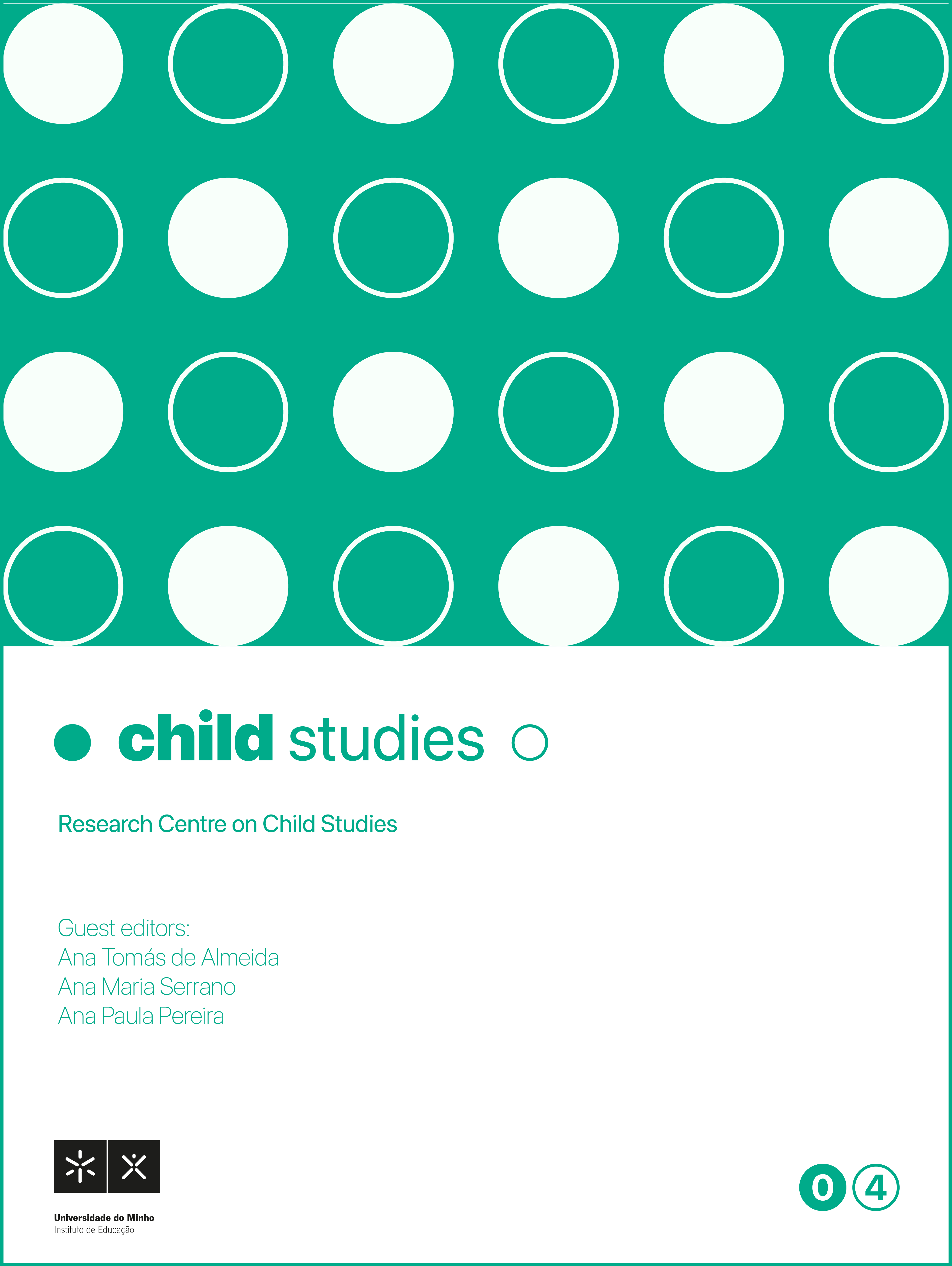Evidence-Based Practices in an Early Intervention service in Spain: the voice of families
DOI:
https://doi.org/10.21814/childstudies.5671Keywords:
Evidence-Based Practices, Early Childhood Intervention, familiesAbstract
This study was carried out at the Centro de Atención Temprana y Escuela Infantil L'Alqueria, Universidad Catolica de Valencia, as part of the Observatorio Internacional de Atención Temprana y Desarrollo Infantil (International Observatory of Early Childhood Intervention and Development), and its aim was to identify the families' perceptions and role in the intervention process, the child's development, the quality of family life and their own empowerment. It involved the participation of a final sample of five families accompanied by four professionals for 11 months. The source of data used was audio recordings of the families, transcribed by the researcher, and the application of instruments before and after six months of intervention, which were analysed qualitatively. The analysis focused on the families' perceptions of the intervention process, child development, family quality of life and empowerment. The results indicate that families perceive the intervention as support, feel empowered to act in the contexts, learn strategies for child development and identify learning opportunities in their routines. Communication is valued, showing that families have a voice in the intervention process. The responses to the instruments indicate that families have a positive view of their children's development and perceive an improvement in the quality of family life. These findings point to the importance of evidence-based practices in Early Intervention.
References
Bardin, L. (2011). Análise de conteúdo. São Paulo: Edições 70.
Bailey, D. B., Raspa, M., Olmsted, M. G., Novak, S. P., Sam, A. M., Humphreys, B. P., Nelson, R., Robinson, N., & Guillen, C. (2011). Development and Psychometric Validation of the Family Outcomes Survey-Revised. Journal of Early Intervention, 33(1), 6-23. https://doi.org/10.1177/1053815111399441 DOI: https://doi.org/10.1177/1053815111399441
Dalmau, M., Balcells-Balcells, A., Giné, C., Cañadas, M., Casas, O., Salat, Y., Farré, V., & Calaf, N. (2017). Cómo implementar el modelo centrado en la familia en la intervención temprana. Anales de psicología, 33(3), 641-651. http://dx.doi.org/10.6018/analesps.33.3.263611 DOI: https://doi.org/10.6018/analesps.33.3.263611
Division for Early Childhood. (2014). Recommended Practices. Retrieved from www.dec-sped.org/recommendedpractices
Dunst, C. J. (2009). Implications of evidence-based practices for personnel preparation development in Early Childhood Intervention. Infants & Young Children, 22(1), 44-53. DOI: https://doi.org/10.1097/01.IYC.0000343336.34528.ea
Dunst, C. J. (2017). Research Foundations for Evidence-Informed Early Childhood Intervention Performance Checklists. Educ. Sci., 7(4), 78. doi:10.3390/educsci7040078 DOI: https://doi.org/10.3390/educsci7040078
ECTA Center. (2024). Evidence-Based Practice. Retrieved from https://ectacenter.org/topics/evbased/evbased.asp
Early Childhood Outcomes Center. (2009). Family Outcomes Surveys - Resultados para a Família. Retrieved from https://ectacenter.org/eco/pages/familysurveys.asp
Fernández-Valero, R., Serrano, A. M., McWilliam, R., & Cañadas, M. (2020). Variables predictoras del empoderamiento familiar en prácticas de atención temprana centradas en la familia. Rev. Logop. Foniatría Audiol., 40, 128–137. DOI: https://doi.org/10.1016/j.rlfa.2020.05.003
García Grau, P., McWilliam, R., Martínez-Rico, G., & Murillo, C. P. M. (2021). Rasch Analysis of the Families in Early Intervention Quality of Life (FEIQoL) Scale. Applied Research in Quality of Life, 16, 383–399. https://doi.org/10.1007/s11482-019-09761-w DOI: https://doi.org/10.1007/s11482-019-09761-w
McWilliam, R. A., & García Grau, P. (2017). Families in Early Intervention Quality of Life (FEIQoL). Retrieved from https://eieio.ua.edu/uploads/1/1/0/1/110192129/feiqol_english.pdf
Moore, T. G. (2020). The first 1000 days; evidence and implications. Half-day workshop for national ARACY / CCCH Early Years Summit, Melbourne, 10 March.
Pimentel, J. Z. S. (2005). Intervenção focada na família: Desejo ou realidade. In Percepções de pais e profissionais sobre as práticas de apoio precoce a crianças com necessidades educativas especiais e suas famílias. Secretariado Nacional para a Reabilitação e Integração das Pessoas com Deficiência, Lisboa.
Ramos, M. M. A., & Della Barba, P. C. S. (2021). Ages and Stages Questionnaires Brazil in monitoring development in early childhood education. Anais da academia brasileira de ciências, 93, 1-13. DOI: https://doi.org/10.1590/0001-3765202120201838
Squires, J., et al. (2009). Ages and Stages Questionnaires – ASQ-3 correspondente à idade da criança.
Trivette, C. M., Dunst, C. J., & Hamby, D. W. (2010). Influências das práticas de intervenção dos sistemas familiares nas interações pais-filhos e no desenvolvimento infantil. Topics in Early Childhood Special Education, 30(1), 3-19. DOI: https://doi.org/10.1177/0271121410364250
Triviños, A. N. S. (2009). Introdução à Pesquisa em Ciências Sociais: a Pesquisa Qualitativa em Educação – O Positivismo, A Fenomenologia, O Marxismo (5th ed.). São Paulo: Atlas.
Turnbull, A. P. (2003). A qualidade de vida das famílias como resultado dos serviços: o novo paradigma. In M. A. Verdugo & F. B. Jordán de Urríes (Coords.), Investigación, innovación y cambio. V Jornadas Científicas de Investigación sobre Personas con Discapacidad 2003 (pp. 61-82). Espanha: Amarú.
Verdugo, M. A., Schalock, R. L., Keith, K. D., & Stancliffe, R. (2005). Qualidade de vida e sua mensuração: Princípios e diretrizes importantes. Journal of Intellectual Disability Research, 49(10), 707-717. DOI: https://doi.org/10.1111/j.1365-2788.2005.00739.x
Downloads
Published
How to Cite
Issue
Section
License
Copyright (c) 2024 Patricia Carla de Souza Della Barba, Margarita Cañadas

This work is licensed under a Creative Commons Attribution-NonCommercial 4.0 International License.



